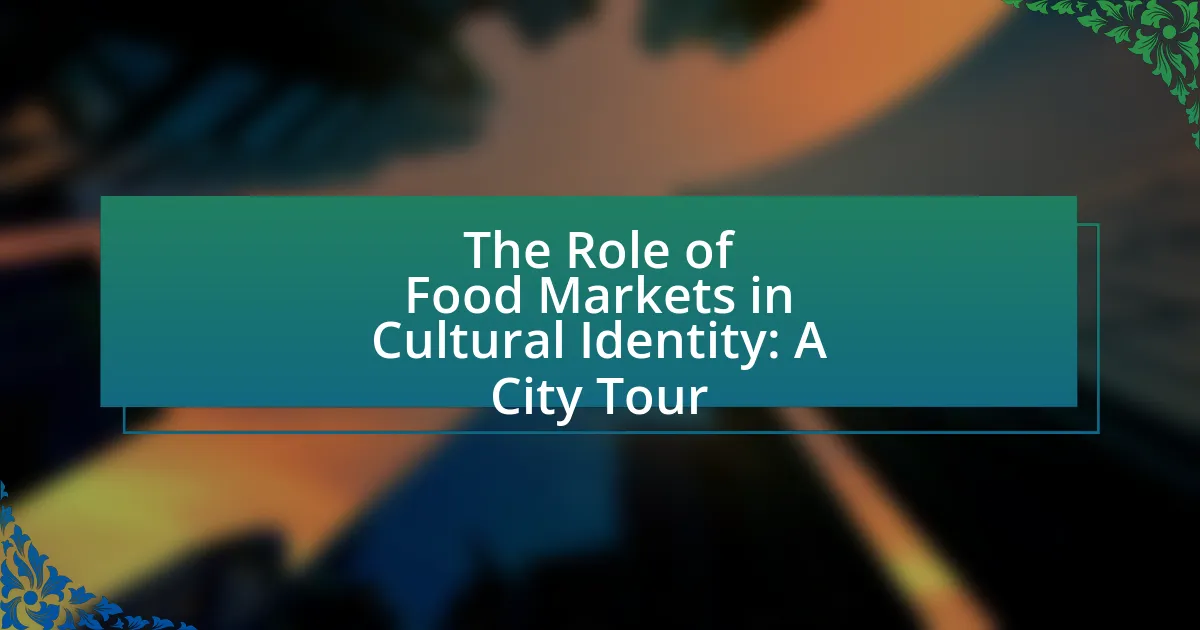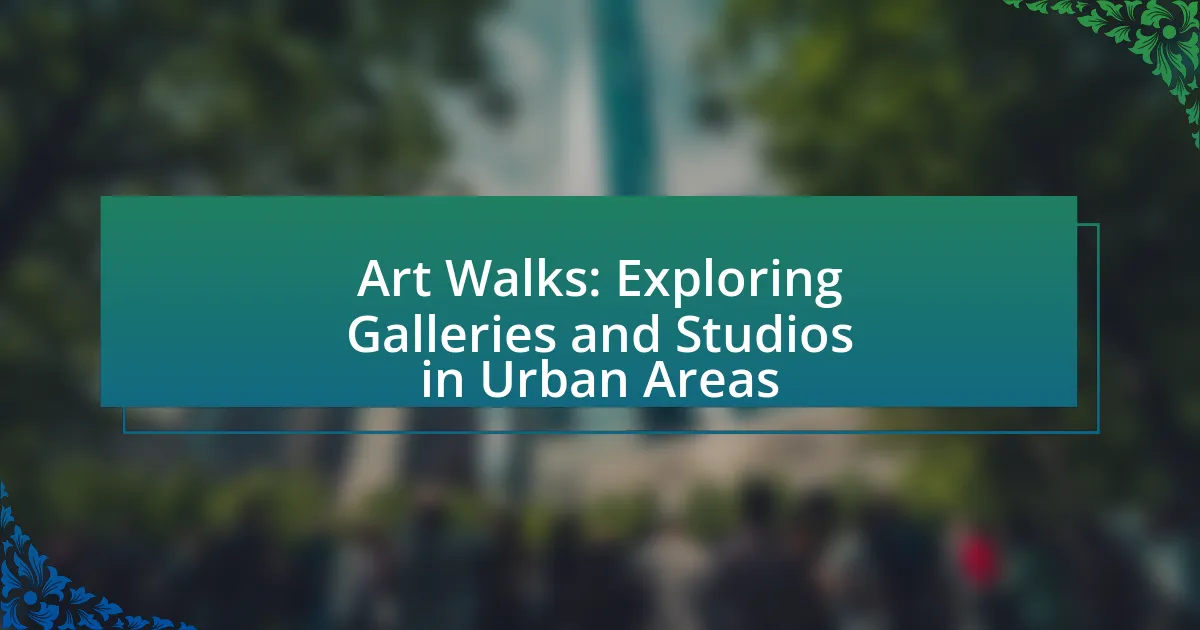Cultural events play a significant role in driving economic growth in cities by attracting tourism, generating revenue, and creating jobs. Events such as festivals, concerts, and art exhibitions stimulate local economies through increased spending on accommodations, dining, and entertainment. Studies indicate that cultural events can yield substantial economic impacts, with cities experiencing boosts in local business revenue and job creation. Additionally, these events enhance community engagement and social cohesion, further contributing to urban development and sustainability. The article explores the various types of cultural events, their influence on local businesses, and the long-term economic benefits they provide to communities.
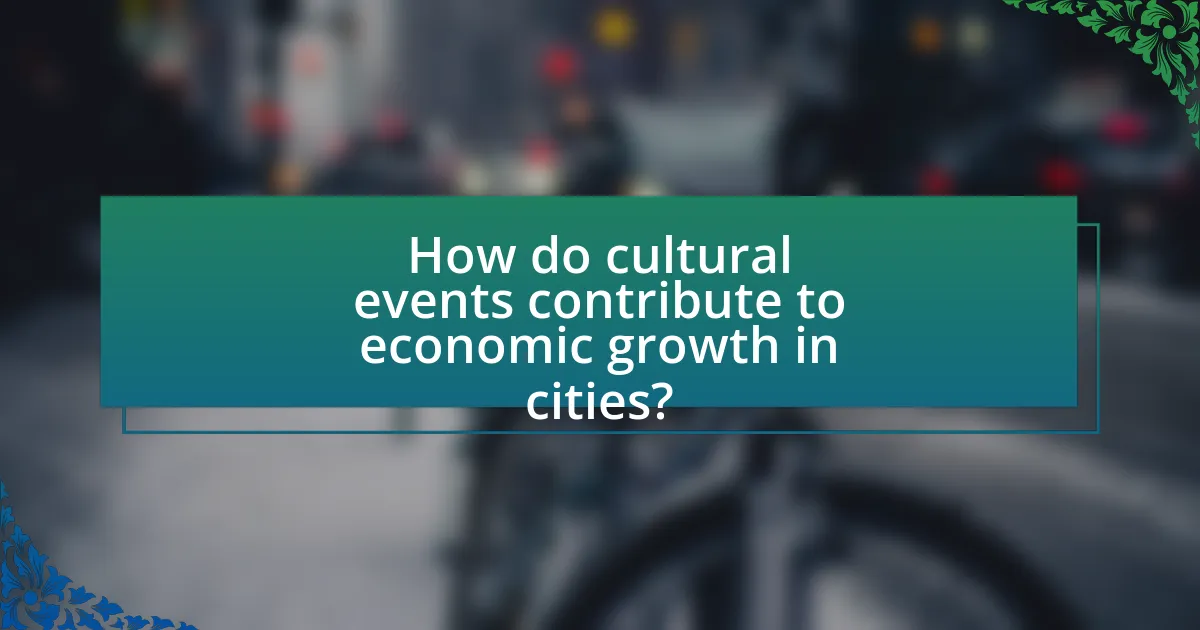
How do cultural events contribute to economic growth in cities?
Cultural events contribute to economic growth in cities by attracting tourism, generating revenue, and creating jobs. These events, such as festivals, concerts, and art exhibitions, draw visitors who spend money on accommodations, food, and local attractions. For instance, a study by the National Endowment for the Arts found that arts and cultural events can generate significant economic impact, with cities like Austin, Texas, reporting over $1 billion in economic activity from their annual South by Southwest festival. Additionally, cultural events stimulate local businesses and encourage investment in infrastructure, further enhancing the economic landscape of the city.
What types of cultural events are most impactful?
Cultural events that are most impactful include festivals, art exhibitions, and concerts. These events attract large audiences, stimulate local economies, and foster community engagement. For instance, a study by the National Endowment for the Arts found that arts festivals can generate significant economic activity, with some events bringing in millions of dollars in revenue for local businesses. Additionally, concerts often lead to increased tourism, as visitors travel to attend performances, further boosting local economies.
How do festivals influence local businesses?
Festivals significantly boost local businesses by increasing foot traffic and consumer spending. During festivals, local shops, restaurants, and service providers experience heightened sales due to the influx of visitors attracted by the event. For instance, a study by the National Endowment for the Arts found that cultural events can generate up to $1.5 billion in economic activity, with local businesses benefiting from increased patronage. Additionally, festivals often create opportunities for vendors and artisans, further stimulating the local economy. This dynamic interaction between festivals and local businesses illustrates how cultural events can drive economic growth in cities.
What role do art exhibitions play in economic development?
Art exhibitions significantly contribute to economic development by attracting tourism, generating revenue, and fostering local business growth. They draw visitors who spend money on accommodations, dining, and entertainment, thereby stimulating the local economy. For instance, a study by the National Endowment for the Arts found that arts-related tourism can lead to a 20% increase in local business revenue during major exhibitions. Additionally, art exhibitions create job opportunities in various sectors, including hospitality and retail, further enhancing economic activity.
Why are cultural events important for urban development?
Cultural events are important for urban development because they stimulate economic growth, enhance community engagement, and promote tourism. These events attract visitors, which increases local spending in businesses such as restaurants, hotels, and shops. For instance, a study by the National Endowment for the Arts found that arts and culture events generate significant economic impact, with every dollar spent on the arts returning approximately $4 to the local economy. Additionally, cultural events foster social cohesion and community identity, making urban areas more vibrant and appealing. This combination of economic stimulation and community enhancement underscores the critical role cultural events play in urban development.
How do cultural events enhance community engagement?
Cultural events enhance community engagement by fostering social connections and promoting local identity. These events create opportunities for residents to interact, collaborate, and participate in shared experiences, which strengthens community bonds. For instance, a study by the National Endowment for the Arts found that participation in cultural activities increases civic engagement, with 60% of attendees reporting a greater sense of belonging to their community. Additionally, cultural events often highlight local traditions and history, reinforcing a sense of pride and ownership among residents. This engagement not only enriches the community’s social fabric but also contributes to economic growth by attracting visitors and stimulating local businesses.
What is the relationship between cultural events and tourism?
Cultural events significantly enhance tourism by attracting visitors who seek unique experiences tied to local heritage and traditions. These events, such as festivals, art exhibitions, and performances, create opportunities for economic growth through increased spending in hospitality, transportation, and local businesses. For instance, a study by the National Endowment for the Arts found that cultural tourism contributes over $27 billion annually to the U.S. economy, demonstrating the direct correlation between cultural events and tourism revenue.
How do cultural events create job opportunities?
Cultural events create job opportunities by stimulating local economies and attracting tourism. These events require a range of services, including event planning, security, catering, and hospitality, which directly generate employment. For instance, a study by the National Endowment for the Arts found that arts and cultural events contribute significantly to job creation, with the arts sector supporting over 4.6 million jobs in the United States alone. Additionally, cultural events often lead to increased spending in local businesses, further enhancing job growth in sectors such as retail and food services.
What sectors benefit from increased employment due to cultural events?
The sectors that benefit from increased employment due to cultural events include tourism, hospitality, retail, and entertainment. Cultural events attract visitors, which boosts demand in these sectors. For instance, a study by the National Endowment for the Arts found that cultural events can increase local tourism by up to 30%, leading to higher employment in hotels, restaurants, and shops. Additionally, the entertainment sector sees a rise in job opportunities related to event management, production, and staffing, as cultural events require a significant workforce to operate successfully.
How do cultural events stimulate entrepreneurship?
Cultural events stimulate entrepreneurship by creating opportunities for networking, innovation, and market exposure. These events attract diverse audiences, which fosters collaboration among local businesses and entrepreneurs. For instance, festivals and art fairs provide platforms for small businesses to showcase their products, leading to increased sales and brand recognition. According to a study by the National Endowment for the Arts, cultural events can generate significant economic activity, with local businesses experiencing a boost in revenue during such events. This economic impact encourages entrepreneurs to invest in their ventures, ultimately driving growth in the local economy.
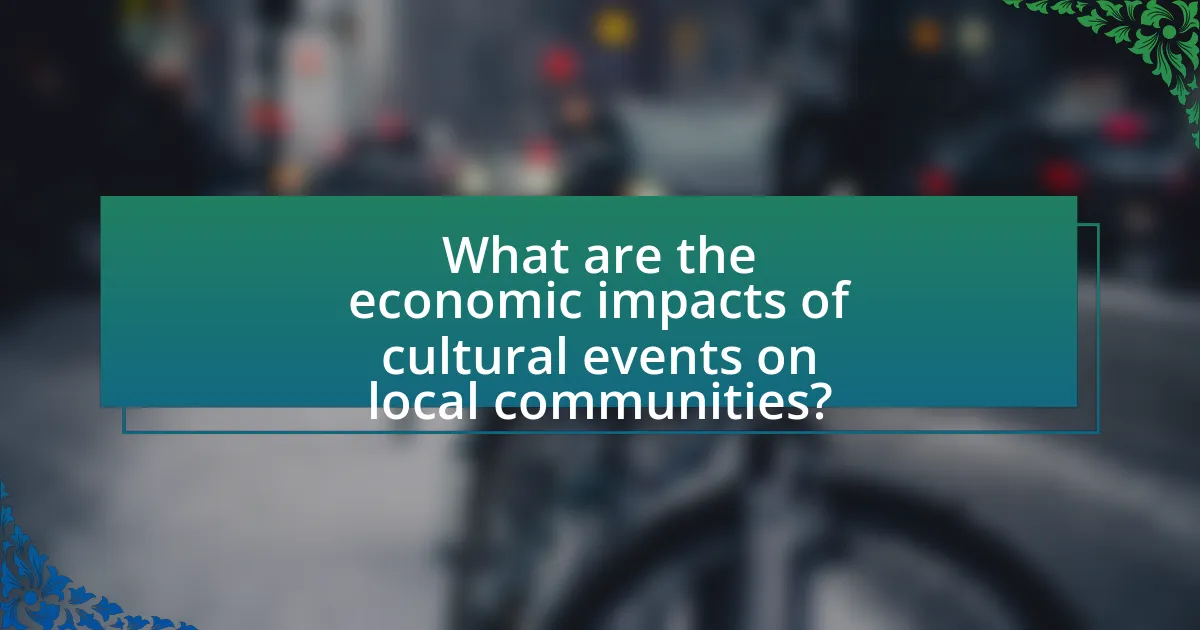
What are the economic impacts of cultural events on local communities?
Cultural events significantly boost the economic vitality of local communities by increasing tourism, creating jobs, and generating revenue. For instance, festivals and art exhibitions attract visitors who spend money on accommodations, food, and local attractions, thereby stimulating the local economy. A study by the National Endowment for the Arts found that arts and culture contribute over $877 billion to the U.S. economy, supporting 4.6 million jobs. Additionally, cultural events often lead to infrastructure improvements, as cities invest in facilities and services to accommodate increased visitor traffic, further enhancing economic growth.
How do cultural events affect local revenue?
Cultural events significantly boost local revenue by attracting visitors and stimulating spending in various sectors. For instance, festivals and art exhibitions draw tourists who spend on accommodations, dining, and entertainment, thereby increasing sales for local businesses. A study by the National Endowment for the Arts found that arts and culture events can generate up to $27 in economic return for every $1 invested, highlighting their substantial impact on local economies. Additionally, cultural events create job opportunities and enhance community engagement, further contributing to economic growth.
What is the impact on sales for local vendors during events?
Local vendors experience a significant increase in sales during events, often seeing sales rise by 20% to 50% compared to regular days. This boost occurs due to heightened foot traffic and increased consumer spending associated with events. For instance, a study by the National Endowment for the Arts found that cultural events can attract thousands of attendees, directly benefiting local businesses through increased patronage. Additionally, events create a festive atmosphere that encourages impulse purchases, further enhancing sales for vendors.
How do cultural events influence property values in the area?
Cultural events significantly influence property values in the area by enhancing the attractiveness of neighborhoods, which can lead to increased demand for housing. When cultural events, such as festivals or art exhibitions, occur, they draw visitors and residents alike, creating a vibrant community atmosphere. This heightened interest often results in property appreciation; for instance, a study by the National Association of Realtors found that homes located near cultural venues can see value increases of up to 20% compared to similar properties further away. Additionally, the presence of cultural events can stimulate local businesses, further contributing to economic growth and, consequently, higher property values.
What are the long-term economic benefits of hosting cultural events?
Hosting cultural events generates significant long-term economic benefits, including increased tourism, job creation, and enhanced community development. These events attract visitors who spend money on accommodations, dining, and local attractions, thereby boosting the local economy. For instance, a study by the National Endowment for the Arts found that arts and culture events can lead to a 4:1 return on investment in terms of tourism revenue. Additionally, cultural events create jobs in various sectors, including hospitality, retail, and entertainment, contributing to lower unemployment rates. Furthermore, they foster community pride and cohesion, which can lead to increased investment in local infrastructure and services, ultimately enhancing the overall economic landscape of the host city.
How do cultural events contribute to sustainable economic growth?
Cultural events contribute to sustainable economic growth by attracting tourism, fostering local business development, and enhancing community engagement. These events draw visitors who spend money on accommodations, food, and entertainment, which stimulates the local economy. For instance, a study by the National Endowment for the Arts found that arts and cultural events can generate significant economic impact, with every dollar spent on the arts returning approximately $4 to the local economy. Additionally, cultural events create opportunities for local businesses to thrive, as they often provide platforms for artisans, vendors, and service providers. This not only boosts employment but also encourages the preservation of local culture and heritage, which can lead to long-term economic sustainability.
What are the potential risks associated with cultural events?
Cultural events can pose several potential risks, including financial loss, safety hazards, and community backlash. Financially, events may exceed budgets due to unforeseen expenses, leading to significant losses for organizers and sponsors. Safety hazards can arise from overcrowding, inadequate emergency planning, or poor infrastructure, resulting in injuries or even fatalities, as seen in incidents at large festivals. Additionally, cultural events may face community backlash if they are perceived as disruptive or misaligned with local values, which can lead to protests or decreased attendance. These risks highlight the importance of thorough planning and risk management in organizing cultural events.
How do cities measure the economic impact of cultural events?
Cities measure the economic impact of cultural events primarily through economic impact assessments that analyze direct, indirect, and induced effects on local economies. These assessments often utilize methodologies such as input-output models, which quantify the spending by attendees, the jobs created, and the overall contribution to the local GDP. For instance, a study conducted by the National Endowment for the Arts found that cultural events can generate significant revenue, with festivals attracting thousands of visitors who spend on accommodations, food, and entertainment, thereby stimulating local businesses. Additionally, cities may employ surveys to gather data on visitor spending patterns and use tax revenue analysis to evaluate the financial benefits derived from increased tourism and local engagement during these events.
What metrics are used to evaluate success?
Metrics used to evaluate success in the context of cultural events driving economic growth in cities include attendance numbers, economic impact assessments, and community engagement levels. Attendance numbers provide a direct measure of interest and participation, while economic impact assessments quantify the financial benefits generated, such as increased spending in local businesses and job creation. Community engagement levels reflect the extent to which residents and visitors interact with the event, indicating its relevance and potential for fostering social cohesion. These metrics collectively offer a comprehensive view of the success of cultural events in contributing to economic growth.
How can cities improve their assessment methods?
Cities can improve their assessment methods by integrating data analytics and community feedback into their evaluation processes. Utilizing advanced data analytics allows cities to analyze economic impacts of cultural events quantitatively, providing insights into visitor spending and local business growth. For instance, cities like Edinburgh have employed data-driven assessments to measure the economic contributions of their festivals, revealing that the Edinburgh Festival Fringe generates over £140 million annually for the local economy. Additionally, incorporating community feedback through surveys and public forums ensures that assessments reflect the needs and perceptions of residents, leading to more accurate evaluations of cultural events’ impacts. This dual approach of data analytics and community engagement enhances the reliability and relevance of assessment methods.

What strategies can cities implement to maximize the economic benefits of cultural events?
Cities can maximize the economic benefits of cultural events by implementing targeted marketing strategies, enhancing infrastructure, and fostering community engagement. Targeted marketing strategies, such as utilizing social media and partnerships with local businesses, can increase attendance and visibility, leading to higher revenue. For instance, cities that promoted events through digital platforms saw attendance increases of up to 30%, as reported by the National Endowment for the Arts. Enhancing infrastructure, including transportation and accommodation options, ensures that visitors can easily access events, which can boost local spending. A study by the Urban Institute found that cities investing in public transport improvements during cultural events experienced a 20% rise in visitor spending. Finally, fostering community engagement through volunteer programs and local sponsorships can create a sense of ownership and pride, encouraging residents to participate and promote events, which further drives economic growth.
How can cities effectively promote cultural events?
Cities can effectively promote cultural events by leveraging targeted marketing strategies, community engagement, and partnerships with local businesses. Targeted marketing strategies, such as social media campaigns and local advertising, can reach specific demographics interested in cultural activities. Community engagement through workshops, volunteer opportunities, and local input can foster a sense of ownership and excitement around events. Additionally, partnerships with local businesses can enhance visibility and provide mutual benefits, as seen in cities like Austin, Texas, where collaboration with local venues has significantly increased attendance at cultural festivals. These methods not only raise awareness but also drive economic growth by attracting tourists and stimulating local economies.
What marketing strategies are most effective for cultural events?
Effective marketing strategies for cultural events include targeted social media campaigns, partnerships with local businesses, and community engagement initiatives. Targeted social media campaigns leverage platforms like Facebook and Instagram to reach specific demographics, increasing event visibility; for instance, a study by Eventbrite found that 80% of event organizers use social media for promotion. Partnerships with local businesses can enhance credibility and broaden outreach, as seen in successful festivals that collaborate with nearby restaurants and shops to offer discounts or promotions. Community engagement initiatives, such as workshops or pre-event activities, foster local interest and participation, which can significantly boost attendance and economic impact, as evidenced by the 2019 National Endowment for the Arts report highlighting the correlation between community involvement and event success.
How can social media enhance event visibility?
Social media enhances event visibility by providing a platform for real-time engagement and broad audience reach. Through targeted advertising and organic sharing, event organizers can promote their events to specific demographics, increasing attendance and awareness. For instance, a study by Eventbrite found that 80% of event organizers use social media to promote their events, leading to a significant increase in ticket sales and participant engagement. Additionally, user-generated content, such as posts and photos from attendees, further amplifies visibility, as it encourages peer sharing and authentic promotion.
What partnerships can cities form to support cultural events?
Cities can form partnerships with local businesses, non-profit organizations, educational institutions, and government agencies to support cultural events. Collaborating with local businesses can provide financial sponsorship and in-kind donations, enhancing event visibility and reach. Non-profit organizations often have experience in event planning and community engagement, which can help in organizing successful cultural events. Educational institutions can contribute by involving students in event planning and execution, fostering a sense of community and learning. Government agencies can offer funding, permits, and logistical support, ensuring that events comply with regulations and reach a broader audience. These partnerships not only enhance the quality and impact of cultural events but also stimulate local economies by attracting visitors and promoting tourism.
How can collaboration with local businesses enhance event success?
Collaboration with local businesses can significantly enhance event success by increasing community engagement and providing essential resources. When local businesses participate, they contribute to the event’s visibility through their established customer bases, which can lead to higher attendance rates. For instance, a study by the National Endowment for the Arts found that events supported by local businesses saw a 30% increase in participation compared to those without such partnerships. Additionally, local businesses can offer sponsorships, in-kind donations, and promotional support, which can reduce costs and improve the overall quality of the event. This synergy not only fosters a sense of community ownership but also stimulates local economic activity, reinforcing the positive impact of cultural events on urban growth.
What role do non-profit organizations play in cultural events?
Non-profit organizations play a crucial role in cultural events by facilitating community engagement, funding, and organization. They often serve as the backbone for cultural initiatives, providing resources and support that enable events to take place. For instance, according to the National Endowment for the Arts, non-profits account for a significant portion of arts funding, which directly impacts the quality and accessibility of cultural events. Additionally, these organizations often mobilize volunteers and local talent, fostering a sense of community ownership and participation in cultural activities. This involvement not only enhances the cultural landscape but also contributes to economic growth by attracting visitors and stimulating local businesses.
What best practices should cities follow when organizing cultural events?
Cities should prioritize community engagement, strategic planning, and effective marketing when organizing cultural events. Engaging local communities ensures that events reflect the interests and needs of residents, fostering participation and support. Strategic planning involves setting clear objectives, budgeting effectively, and coordinating logistics to ensure smooth execution. Effective marketing, utilizing both traditional and digital platforms, increases visibility and attracts diverse audiences. According to a study by the National Endowment for the Arts, cultural events can generate significant economic impact, with local economies benefiting from increased tourism and local spending.
How can cities ensure inclusivity in cultural events?
Cities can ensure inclusivity in cultural events by actively engaging diverse community groups in the planning and execution processes. This approach allows for the representation of various cultural perspectives and needs, fostering an environment where all community members feel valued and included. For instance, cities can conduct surveys and focus groups to gather input from underrepresented populations, ensuring that events reflect the community’s diversity. Additionally, implementing accessibility measures, such as providing transportation options and ensuring venues are wheelchair accessible, further enhances participation. Research indicates that inclusive cultural events not only enrich community engagement but also drive economic growth by attracting a wider audience, as seen in cities like Toronto, where diverse cultural festivals have significantly boosted local economies.
What are the key elements of successful event planning?
The key elements of successful event planning include clear objectives, detailed budgeting, effective marketing, and thorough logistics management. Clear objectives define the purpose and goals of the event, ensuring alignment with the target audience’s interests. Detailed budgeting involves estimating costs and securing funding, which is crucial for financial viability. Effective marketing strategies, such as social media promotion and community outreach, enhance visibility and attendance. Thorough logistics management encompasses venue selection, scheduling, and resource allocation, which are essential for smooth execution. These elements collectively contribute to the overall success of an event, as evidenced by studies showing that well-planned events can significantly boost local economies by attracting visitors and generating revenue.
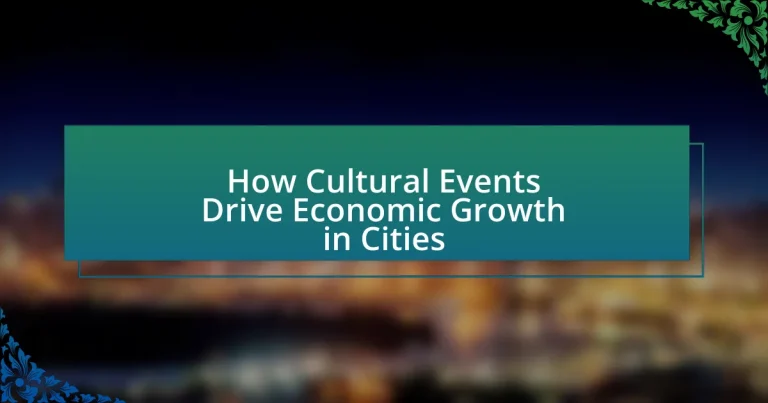
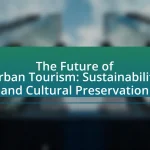
![Hidden Culinary Gems in [City Name]: A Foodie’s Guide to Local Favorites](https://cityofleadville.com/wp-content/uploads/Featured-image-Hidden-Culinary-Gems-in-City-Name-A-Foodies-Guide-to-Local-Favorites-150x150.webp)
